How Much Money Do Flight Attendants Make
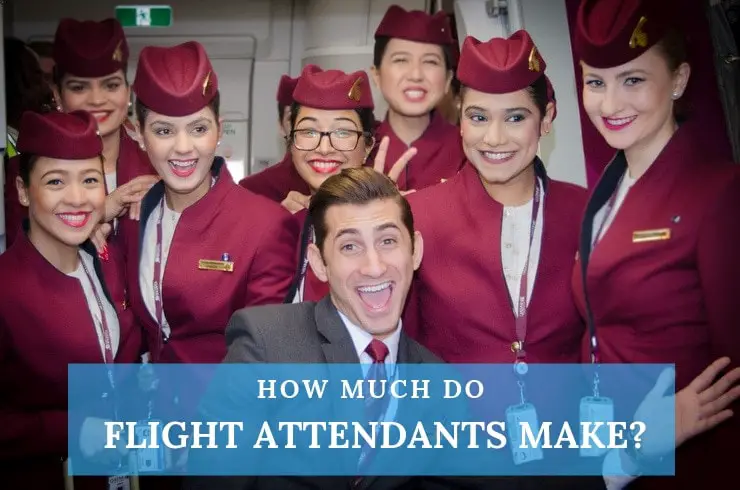
Updated December 31, 2020
Have you ever wondered how much do flight attendants make?
Whenever I talk to people about what I do for a living, their eyes light up because they think that I have a glamorous life just traveling the world. And they also assume that the money I get paid while doing it is pretty good too. But this isn't always the case.
Today I'm going to show you the real salaries of some cabin crew, salaries which vary and depend on many factors: the type of airline, their seniority, how many hours they work, etc. I think you'll be surprised by much of what you are going to learn.
What are the factors that determine how much a flight attendant earns?
- The airline you're working for: All airlines have different pay scales and they change from country to country, depending on the type of operation: charter airlines (an airline that operates flights that are not part of a regular airline routing), private jets, whether it's a major or a low budget airline. Obviously, the major airlines tend to pay more than the regional or low-cost ones, but you should do your own research before applying to the airline of your choice.
- The experience level/seniority:Even inside the same company, there are different salary bands that depend on your seniority or your level of experience. So a junior Iberia flight attendant could be earning 1700€ monthly while a senior one could be earning around 3500€
Because this is a seniority-based pay scale, more experience provides flight attendants with higher base salaries and flying payments. This means that the base salary could be significantly lower for those who joined later, which makes a lot of difference to their take-home pay. - There are also some other factors or bonuses that can increase the size of your paycheck:
- Working night shifts (night pay): these are called red-eye flights because working overnight can lead to having a not very flattering 'red eye' look about you.
- Speaking other languages (LOD): you'll earn a bonus for each foreign language that you speak if you are working on flights that require a Language of Destination flight attendant (LOD)
- Layover allowances (per diem): This is paid whenever flight attendants have to overnight at a destination. This allowance is to cover meals because the hotel room is provided by the company.
- Position/type of aircraft: If you get promoted to Business class, First class or Cabin Manager you'll get a higher base salary and flying pay.
- Transportation allowance: You get a transportation allowance monthly, in my company, for example, it is 100€.
- Your contract and salary conditions also change, even in the same airline, depending on the country you are based: So, for example, the salary of a flight attendant on Norwegian Airlines based in Norway is higher than that of the flight attendant that is based in Spain or Italy, because they pay staff according to the cost of living in that region.
- But the most important factor that determines how big your next paycheck will be is the flying pay:You'll normally get paid a basic salary plus "pay per flight hour".
Pay per flight hour simply means that when we are on the ground we don't get paid. It's important to realize that this includes all the time we spend in the terminal prior to the flight, the briefing, boarding, in between flights and even if the flight is delayed.
Our money clock starts ticking when the doors are closed and the plane starts rolling until we land and chocks on (an old fashioned term that comes from a wedge that was put under a plane's wheels to prevent it moving). So pay per flight hour is from the time the plane starts moving for take off until it comes to a halt after landing. - Hiring through third parties is becoming more common in many industries, and it also happens in the aviation industry. There's nothing wrong with this, but normally the third party contractor offers lower wages and conditions or benefits. So you could be earning less than your colleagues until you are hired directly by the company.
- Commissions: Airlines also have commission schemes which can increase your salary. It could be 10 or 20% on all duty-free and catering sales (not all companies offer this), and the amount you can get can vary from an extra 40€ to 900€ per month. In my company, it's 10% of all onboard sales and that is divided up by the operating crew so that everyone gets a commission. In other airlines, this commission is only for those crew members that sell duty-free.
In the USA, American, Delta, Spirit or Frontier Airlines have flight attendants making in-cabin pitches for credit cards tied to each airline's frequent-flier program. They pay commissions at different rates for success, generally around $50 or more for an approved application.
Other benefits/perks
As a flight attendant you will also get generous travel benefits the most prominent being the: free flights or discounted airfares you are able to have. These are offered by pretty much all airlines and sometimes it includes your friends and family as well, which is no bad thing.
But just a heads up here. Getting this perk is also called flying standby, meaning that you only get on the plane if there are empty seats. There are no guarantees. Which means that it can be very stressful because you can get stranded at an airport until a flight with empty seats becomes available. That's why I always come back from holidays a few days early to give me a safety margin if flights are full and I can't fly standby.
There are other extras that contribute in some way to a flight attendant's earnings: health benefits – medical, dental care- or discounts, crew discounts in many hotels, car rentals, airport shops, and excursions, fitness & beauty centers, etc, these all go toward adding to the financial returns for being a flight attendant.
On the same topic: 18 Pros & Cons of Being a Flight Attendant
But how much does a flight attendant earn?
Okay, the bad news is that there's no straightforward answer to this question, there are just so many variables. But stay with me, and I'll talk you through them.
A flight attendant can earn an average of €20,000 to €45,000 annually ($22,000 to $49,000) in their first year.
There will be those that earn more – I know girls in private jet aviation that are earning €64,000 annually – and there will be those who are earning less than €10,000. Those working for low-cost Hungarian airlines, for example.
But even when you have started working for an airline, you'll only know how much you are earning each month because it depends on the flights you do. Oh, and a few other things.
So let's look at how it all works on a few different airlines.
Case #1: Flight Attendant Salaries at British Airways Mixed Fleet
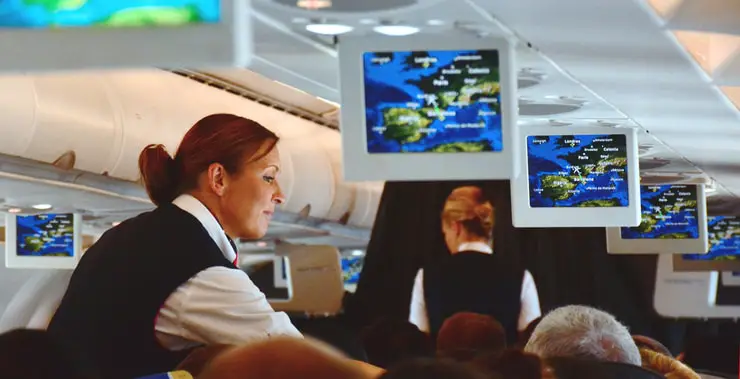
British Airways has four different cabin crew fleets: Worldwide, Euro Fleet, and Mixed Fleet (in London Heathrow) and London Gatwick Fleet.
The mixed fleet is a new fleet that British Airways set up at the end of 2010. Before that, BA used to have a "Worldwide Crew" for the long haul flights and a "European Fleet" for the short-haul flights.
Related topic: Short-Haul vs. Long-Haul Flight Attendant Life
With the creation of "Mixed fleet", they have rostered a mixture of short and long haul flying, but the pay is significantly lower and the conditions are also not as good.
These lower-paid flight attendants have shorter stopovers, and more turnaround flights, which means that the crew and aircraft do a round trip to their destination without staying at it. This means savings for the airline.
Eg: You go to a destination and immediately come back. For example, you fly: London (LGW)- Venice (VCE) – London (LGW).
Although they will still have 2-3 day trips within Europe. The long haul layovers are also reduced to the minimum rest time too, but this includes a 24-72 hour layover.
T his is the career path:
- Cabin crew in Economy or Business
- Qualified cabin crew
- World Class cabin crew
- Customer Service Manager(Senior cabin crew)
- Cabin crew Manager
There has been a lot of controversy over the salary within the mixed fleet because many cabin crews claim that they are not earning what BA promised when they joined. These new flight attendants have an annual base salary of £15,612 which is roughly £1,200-£1,400 per month.
They get £3.14 flying pay per hour( from the moment you check in to the moment you arrive at your base) which comes in at an average of £500-£900 per month. Now if you add your basic pay of £1,200 to your pay per hour (£900 in total) that bumps it up quite a lot, but it depends on how much you fly.
It can really boost your paycheck if you do a lot of flying, but if you are sick or you have your annual leave or you are rostered on a lot of standbys, you'll get a shitty (sorry, but that's the best word to describe it) pay that month.
Now add in Commission: 20% on all duty-free and other onboard sales, split between all the cabin crew onboard.
Bonus: £350 quarterly bonus based on your performance never being late and never having sick days, basically.
To sum up all of the above, BA estimates that the new entry cabin crew should earn from £23,000 to £28,000. But the unions representing cabin crews have said, according to their survey, is that many cabin crew make just £17000-£18000, and are taking second jobs to survive.
After a few years, if you are promoted to World Class Cabin Crew, you would be earning a bit more, £25,000 to £29,000. This includes a starting salary of £18,319 per annum, an hourly payment when you are flying, bonuses for achieving your performance targets, and commission for In-flight retail sales. If you have previous experience of at least 2 years flying as cabin crew and you are in possession of the EASA attestation you can enter this category straight away.
Further down the road, you could be promoted to Customer Service Manager and your base salary would be around £27,500 with earnings an average of £35,000 per annum.
The bottom line is that not all flight attendants are paid the same in British Airways. New hire cabin crew would typically earn much less than the ones hired before 2010, that earn a higher sector pay, higher base salary, and higher allowance pay.
It seems that there's a lot of negotiations happening at the moment between BA and the unions, so everything can change, still a bit up in the air, if you'll forgive the pun.
Anyway, as I said before: What you earn depends mainly on the flights you have, they are what top up your base salary. If you get a lot of training days, standbys or "short trips," unfortunately you'll get a poor salary.
It is possible to swap your flights with other crew and there's a bidding system where you can request the flights that you're interested in, but there is no guarantee of getting these and it's never easy to swap or give away a trip that nobody wants.
Keep in mind that if you are interested in a particular trip, perhaps because it's a great destination or it has higher overnight travel allowance, there will probably be a thousand other flight attendants who are also interested. So it's not that easy to get what you want. Plus the most senior crews get their bids accepted first and newer crew have less chance to get what they bid for.
The wait for your next roster can be nerve-wracking. The upside is that you'll know what you're going to be doing for the month – how many days off you'll have, how many hours you'll be working, if you have many early sign-ons or red-eye flights, etc. which can be very satisfying. Or it can be a total budgetary and social life disappointment
Will you be able to get to your friend's wedding? Will you be able to spend Christmas at home this year? It isn't easy and these sorts of things are what make cabin crew life both crappy and fabulous at the same time,
Oh, and to be fair to BA, these sorts of variations in pay rates and rosters are common amongst all the airlines.
Here is an update of the latest British Airways cabin crew pay offer: British Airways staff could see salaries cut of up to 50%
Case #2: Flight Attendant Salaries at Ryanair
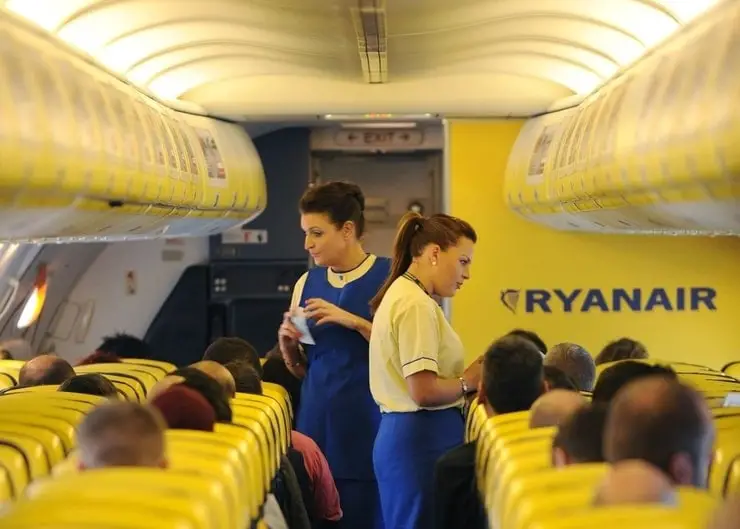
Let's look at Europe's biggest low-cost company, with 450 aircraft and over 9000 cabin crew.
In Ryanair, there are even larger differences between contracts, remuneration, and conditions within cabin crews, so it's difficult to explain exactly how much they actually earn.
I've spoken to many colleagues at Ryanair and they all have different salaries and conditions. You have people with permanent contracts, temporary contracts or even self-employed, some of them earning 2,500€ and others 600€ a month.
Let me explain about self-employed cabin crew.
"Self-employed" means that crew members must open a single person limited company and all taxes, social insurance, responsibility for damages, sick leave or maternity leave will become the sole responsibility/liability of the worker. Personally, I think that this is outrageous!
Temporary contracts are the most common type of contract with Ryanair. You sign with an external agency: such as Crewlink or Workforce/Dalmac. Staff on temporary contracts make up a total of 80% of the cabin crew numbers with the airline.
As a junior temporary cabin crew, you'll get a one-year probationary contract, and after a few years, if everything goes well and they like you, you can be promoted to Purser or Number 1, and they may offer you a direct contract with them, depending on the base you are working from and the airline's needs.
Obviously, the salaries are better when you get a full Ryanair contract.
But sadly, only 20% percent of cabin crew do have permanent contracts in Ryanair. But, thanks to the demands of the unions and changing laws, this number is rising in some countries. In May 2019 in Belgium, Ryanair had to offer a direct contract to 50% of the cabin crew working in that country. Good.
So yes, salaries and contracts also depend mainly on the country you are based in. And that is normally decided by the airline once you finish the training course.
True, you can fill in a form to pick your base of preference, but the hard reality is that your airline will just send you to wherever they need. You can ask for a transfer later, but the wait can take very long, sometimes years, and they don't really care much, which is a real problem.
But, as I said, things are changing.
Since 2018, the 6-week training course is free, which is a big improvement. Before 2018 there was a 500€ registration, fee plus 2999€ course fee. You could pay it all upfront or choose the salary deduction method which was a 300€ deduction per month until you finished paying your full course cost.
Now, the only expense that you'll have to pay during your training is for accommodation and food. And to help with that, there is a 28€ allowance. But the location of the course can be random, it can be in Germany, Italy or Ireland. So that allowance may well not be enough for the living costs in the country where the course is being held.
After signing your contract, you will probably work an average of 90 hours a month. The roster is normally 5 days flying and 3 days off then 5 days flying and 2 days off. So at least you get to know your days off in advance so you can make plans.
For new joiners, there is a 750€ allowance in the first paycheck, that will be deducted from your final paycheck if you leave before 1 year. In that first paycheck, there will be a deduction of around 50-80€ for your airport ID. They give a little, they take a little.
So a basic salary breakdown for Ryanair could look something like this:
The basic pay, which is around 650€, the pay per flight hour (variable depending on your base from 6-7€ )and the standby rate of 25€. So around 1,300€-1,500€ per month.
But there are also senior cabin crew members with Ryanair contract that don't have a base salary. In this case, they get a higher rate: from 14€- 17€ per flight hour and they make 1,800€- 2,000€ per month approx.
But, once again there are many variables in the payment system. In Poland, for example, they are all self-employed so they don't have a basic salary. Neither do they have pensions, or sick and holiday pay. They are only paid flying hours and the 10% commission from on-board sales. So if they don't have many flying hours, they can be earning a salary as low as 600€.
| Most senior cabin crew | New cabin crew |
| No Base Salary | Base salary: 450€ to 650€ |
| Pay per flight hour: 17€ (more or less, depends on the country) | Pay per flight hour: 5€ (more or less, depends on the country) |
Examples of wages in Ryanair depending on the Country:
In Dublin, you'll get an average salary of 1,700 to 1,900€ if you are subcontracted. In Spain, you would be getting 1,200 – 1,400€ for example. If you are hired directly, from 2,000 – 2,500€.
The bottom line is that once you are hired by Ryanair, you can earn between 25,000 – 40,000€ annually ($28,000 – $45,000).
Case #3: Flight Attendant Salaries at Emirates Airlines
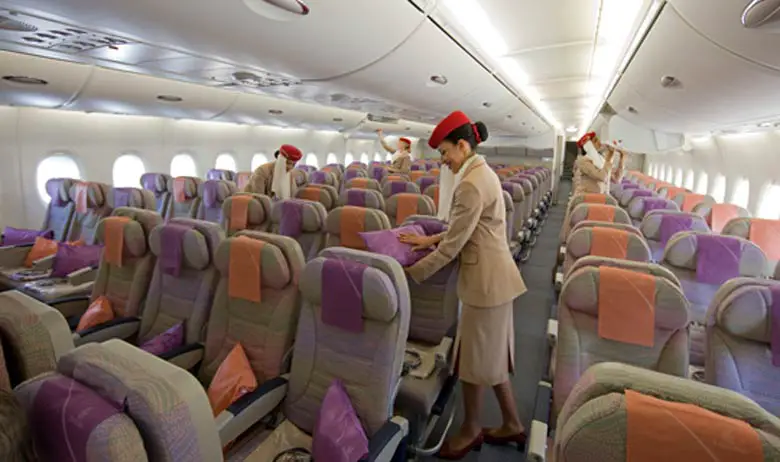
Flight attendants et Emirates Airlines earn from $36,000 to $53,000 a year.
This money includes base salary, flight hours, and layover payments.
The salaries in the (UAE) United Arab Emirates are tax-free and Emirates provides free accommodation to all the crew (housing bills included).
If you want to know more aboutEmirates cabin crew salary and benefits read this article.
Case #4: Flight Attendant Salaries at Qatar Airways
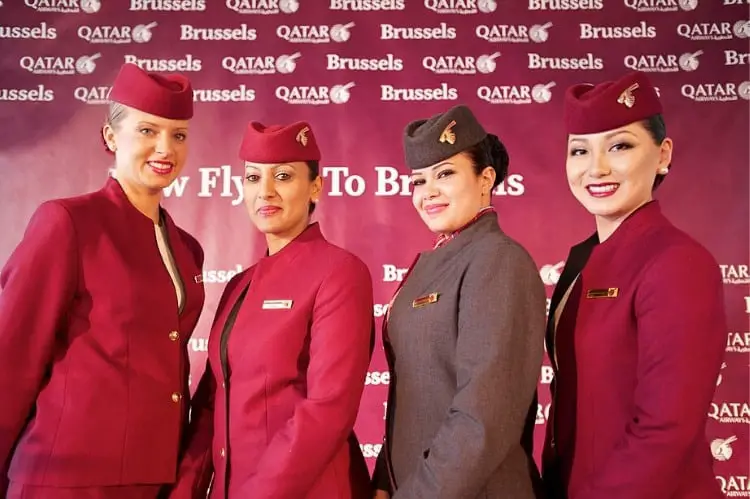
Flight attendants at Qatar Airways start out at 84,000 QAR – 156,000 QAR ($23,000 – $42,800) a year.
This money is tax-free and includes basic payment plus flight hours and layover allowance, but as the flight attendant becomes more experienced, that rate goes up quite considerably.
Besides, Qatar Airways provides free accommodation to all the crew.
If you're interested in knowing more about Qatar cabin crew salaries and benefits, read this article.
Case #5: Flight Attendant Salaries at Etihad Airways
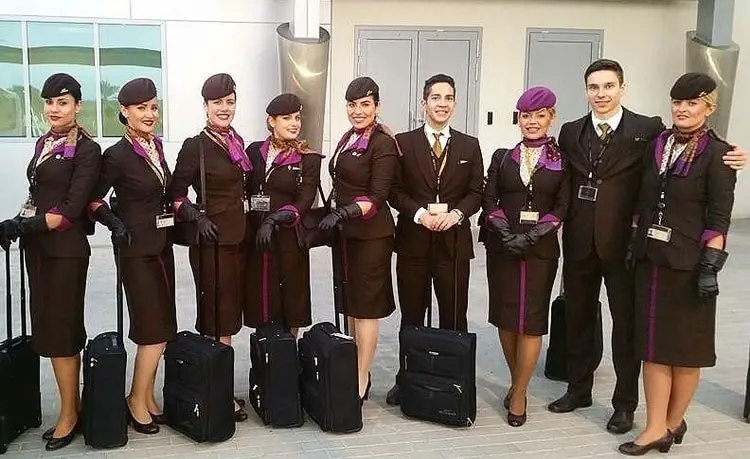
Flight attendants at Etihad Airways start out at 96,000 AED – 120,000 AED ($25,000 – $32,000) a year.
This money is tax-free and includes basic payment plus flight hours and layover allowance, but as the flight attendant becomes more experienced, that rate goes up quite considerably.
Besides, Etihad Airways provides free accommodation to all the crew.
If you want to know more about Etihad cabin crew salaries and benefits, read this article.
Case #6: Flight Attendant Salaries at American Airlines
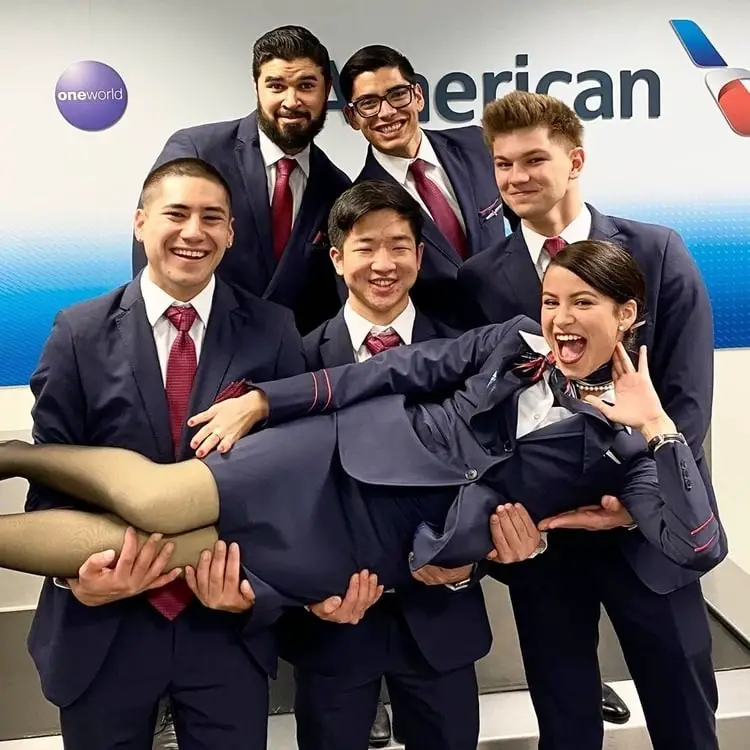
Flight attendants with American Airlines start out at $30,000 – $56,000.
This money includes payment for their flight hours, layover payments (per diem) and any other bonuses.
But as they become more experienced that rate goes up quite considerably.
Highly experienced flight attendants with AA can make up to $80,000 per annum or more.
Make sure you check out my article on American Airlines flight attendant salaries to know more.
Case #7: Flight Attendant Salaries at JetBlue Airways
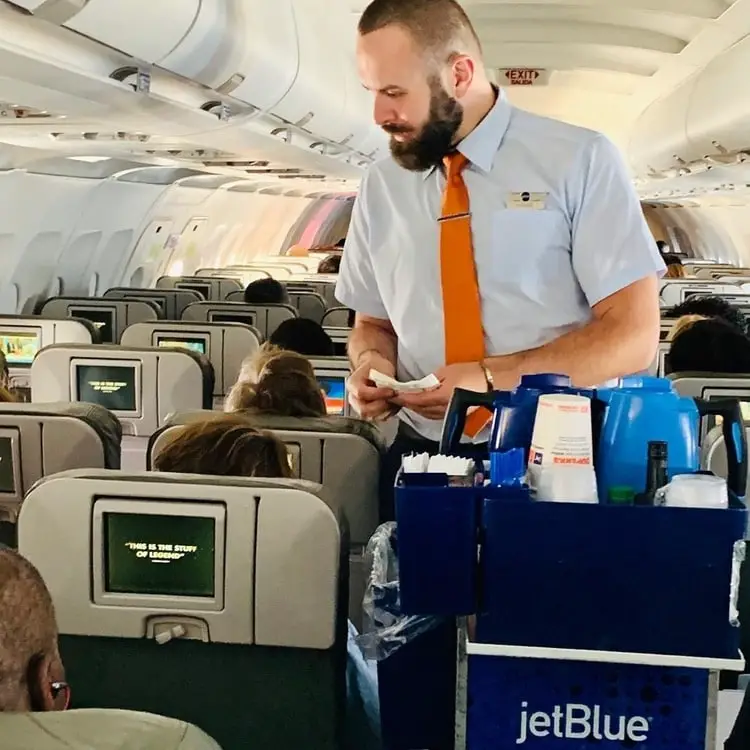
Flight attendants with JetBlue Airways start out making between $25,000 – $35,000.
This salary includes flight hours, per diem, international, position, holiday, redeye, language, recognition, and other forms of payments.
While this is the starting salary, more senior flight attendants can make upwards of $100,000.
Check my article on JetBlue flight attendant salaries if you want to know more details.
Case #8: Flight Attendant Salaries at Delta Airlines
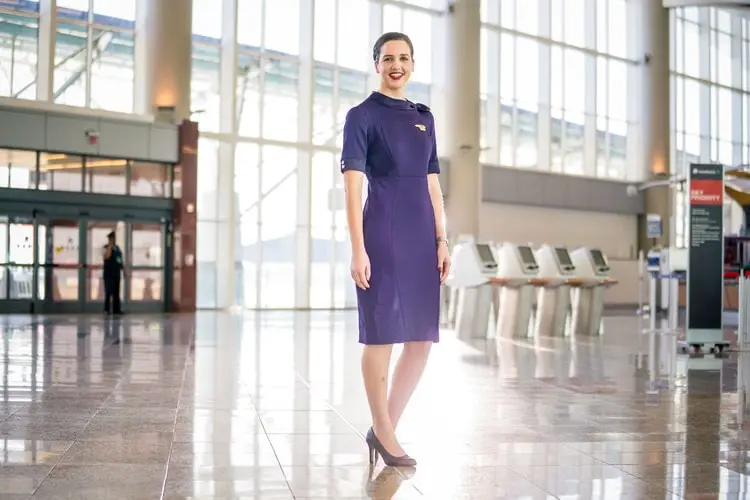
Delta flight attendants in their first year usually make between $33,000 and $45,000 but as they stay with Delta longer they accrue seniority.
Each year the pay rate per hour goes up quite considerably.
Senior flight attendants at Delta Airlines can make over $118,000.
This salary includes everything: standard flight hour pay plus many other additional money compensations, such as per diem (layover allowance for food or other expenses), international flights, cabin manager, holidays, language, and several other forms of payments.
Check out my article to find out all the details (and examples): Delta Airlines flight attendant salaries.
Case #9: Flight Attendant Salaries at Frontier Airlines
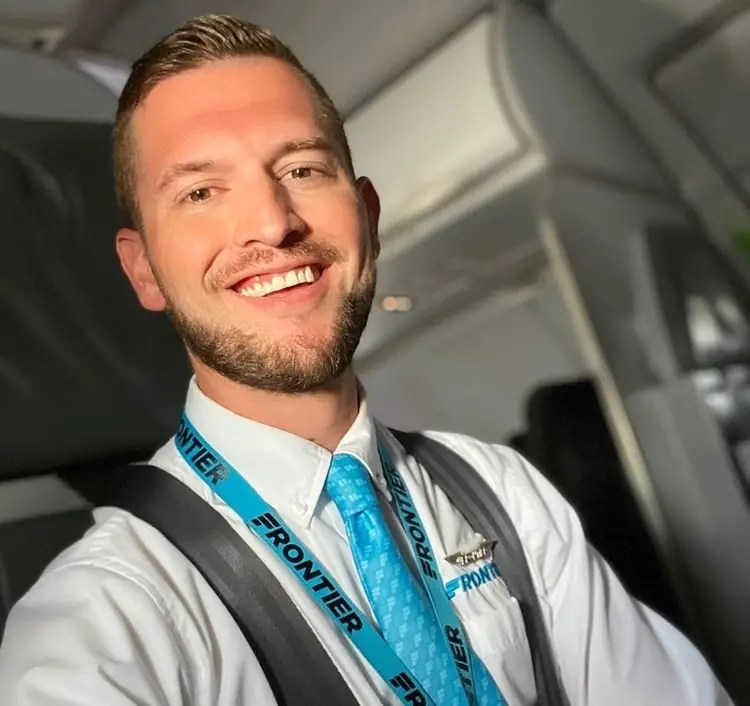
Flight Attendants at Frontier Airlines can expect to make anywhere from $20,000 to $35,000 the first year.
However, this will significantly increase over the years.
Starting pay at Frontier is $23.56 an hour, and caps out at $55.43 when you hit 20 years of service.
Check out my article if you want to know more details about Frontier Airlines flight attendant salaries.
Wrap up
I know all this seems a bit much to take in, but I hope that I have given you an overview of the variations that exist in a flight attendant's pay and condition. And that is the important thing, there are many variables. So do your research, don't be frightened to ask questions and get a very clear understanding of what your career path will be and the pay rates attached to each step.
I'm quite happy to answer any questions and to provide more information about any airline that you may have a query about.
Happy flying!
How Much Money Do Flight Attendants Make
Source: https://www.thesegoldwings.com/flight-attendants-salary/
Posted by: bohnsackeves1987.blogspot.com

0 Response to "How Much Money Do Flight Attendants Make"
Post a Comment